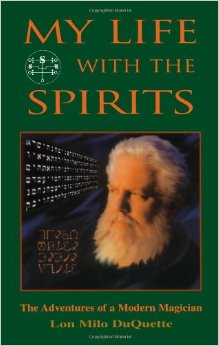Lon Milo DuQuette’s My Life with the Spirits
 My Life With the Spirits
My Life With the Spirits
Weiser Books
1999
191

My Life with the Spirits: The Adventures of a Modern Magician is an autobiography of Lon Milo DuQuette, one of the 21st century’s most famous magickians. DuQuette is a prolific author and lecturer, an Archbishop of Ecclesia Gnostica Catholica, and the United States Deputy National Grand Master of Ordo Templi Orientis.
This is a fast-paced, enjoyable read, with DuQuette’s characteristic humor that begins with an LSD experience in 1967 at the age of 18, and finishes more than 30 years later with reflections on a life well lived (and still being lived!). In between is a roller-coaster ride describing his journey through initiations, evocations, and exorcisms which transformed him from a Methodist altar boy into a modern-day occultist. I highly recommend reading this book (and reading it before reading Low Magick).
DuQuette’s honesty in parts of this book is impressive. For example, in the chapter regarding the Evocation of Orobas, he tells us how his ritual goes horribly wrong (among other problems, he gets cinnamon oil in his eyes), and shares with us his words at the ritual’s conclusion as he realizes the demon he has evoked is himself, and he’s standing in his own way:
“Look at you. You’re a grown man with a wife and a child. You can’t even feed them. How will you pay the rent? … You’ve no job… You’ve no hope…
“It’s your own damned fault. You’re lazy! You’ve always been lazy. You think you’re so special that the world owes you everything. You want to be rich but you can’t make a dime. You dream of being famous, but what have you ever done to deserve fame? You let your music career slip through your fingers because you are too lazy to do any real work, too afraid to pay any real dues. You’re a quitter. You’re a loser! You’ve always been this way. Every chance you have ever had to make something of yourself you screwed up and blamed it on somebody else! But it’s nobody’s fault but yours!” [pp. 99-100]
In Low Magick he refers to this evocation and says “When the fiasco was over, I was a different person—a person who would save his family, provide materially for his wife and his child, and in the days and months and years ahead, clutch onto just enough emotional stability to pursue the Great Work.” [p. 16]
Autobiographies often sugar-coat the past or include made-up stories to make a point. I’m sure DuQuette’s work has some of these aspects, too, but his stories seem real, and they make him feel like a real person: someone who, like the rest of us, is struggling to find answers amidst the vicissitudes of life.
